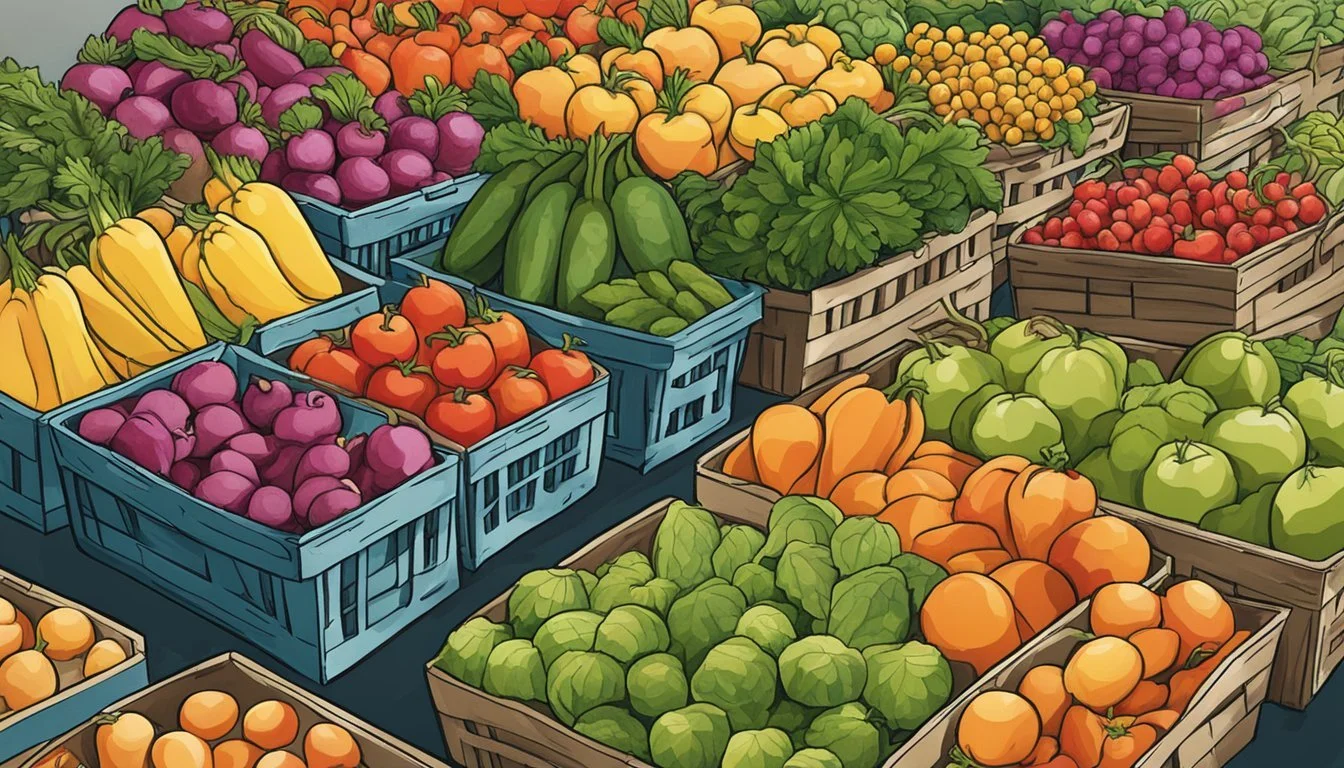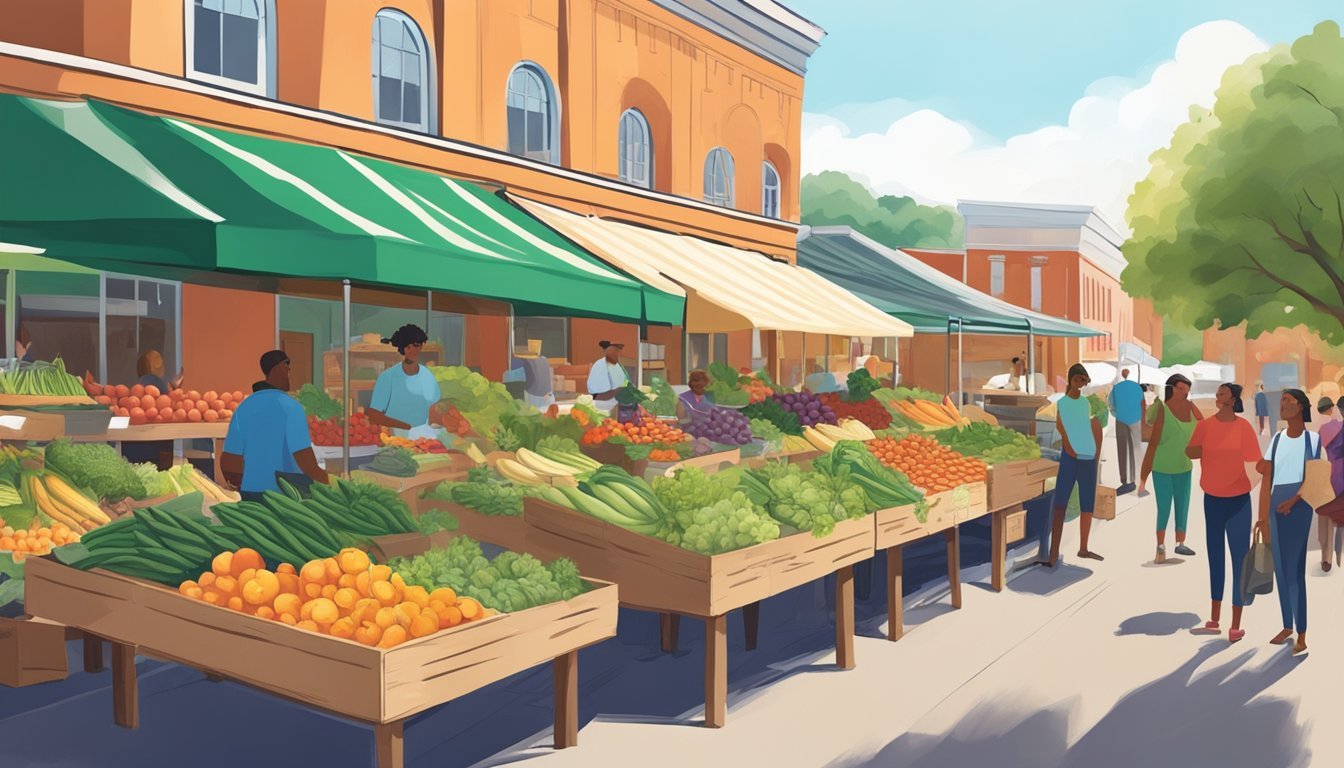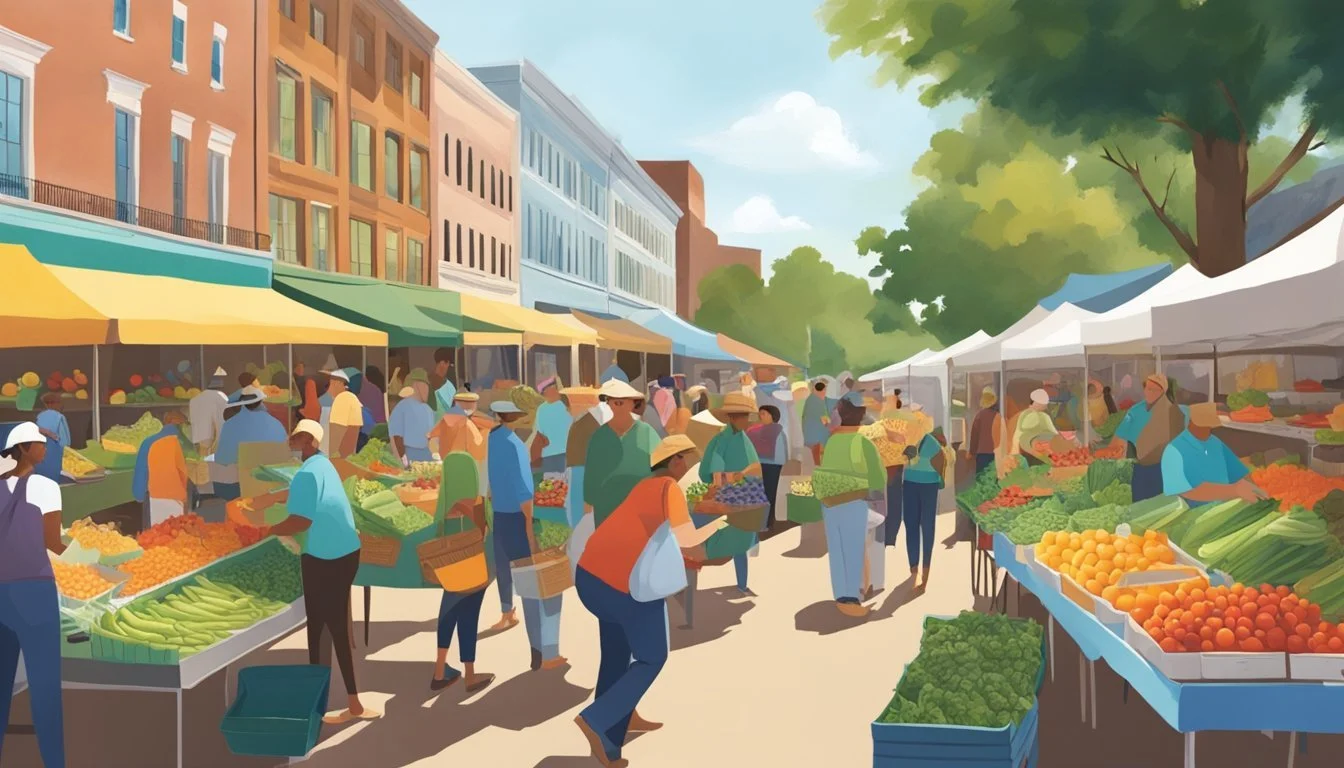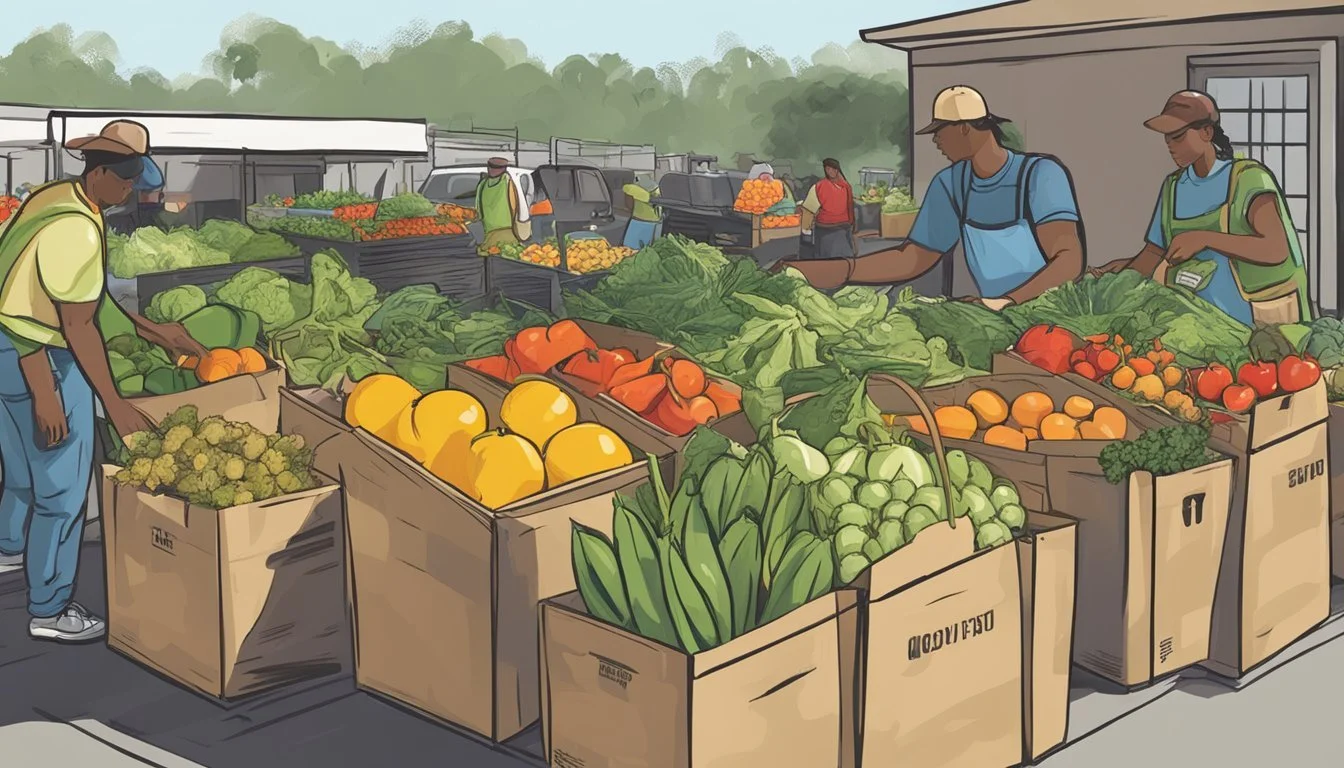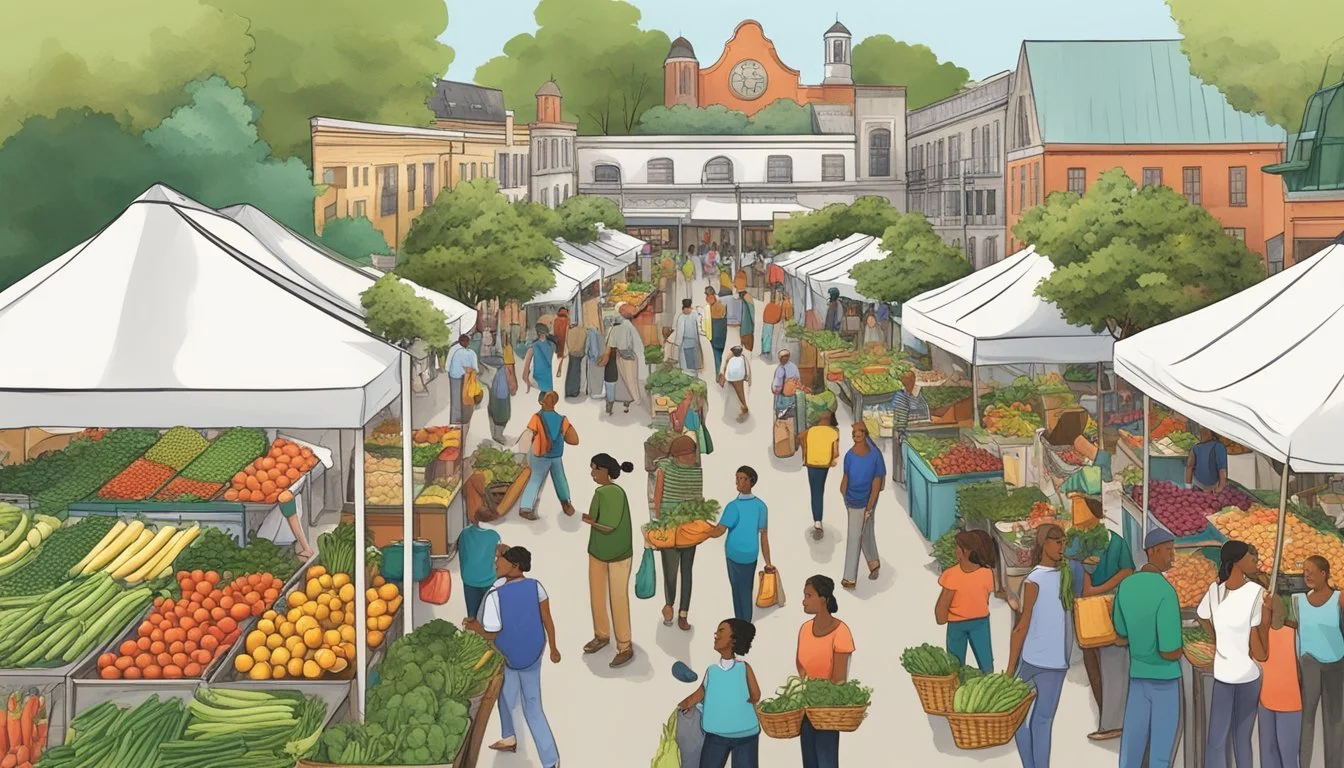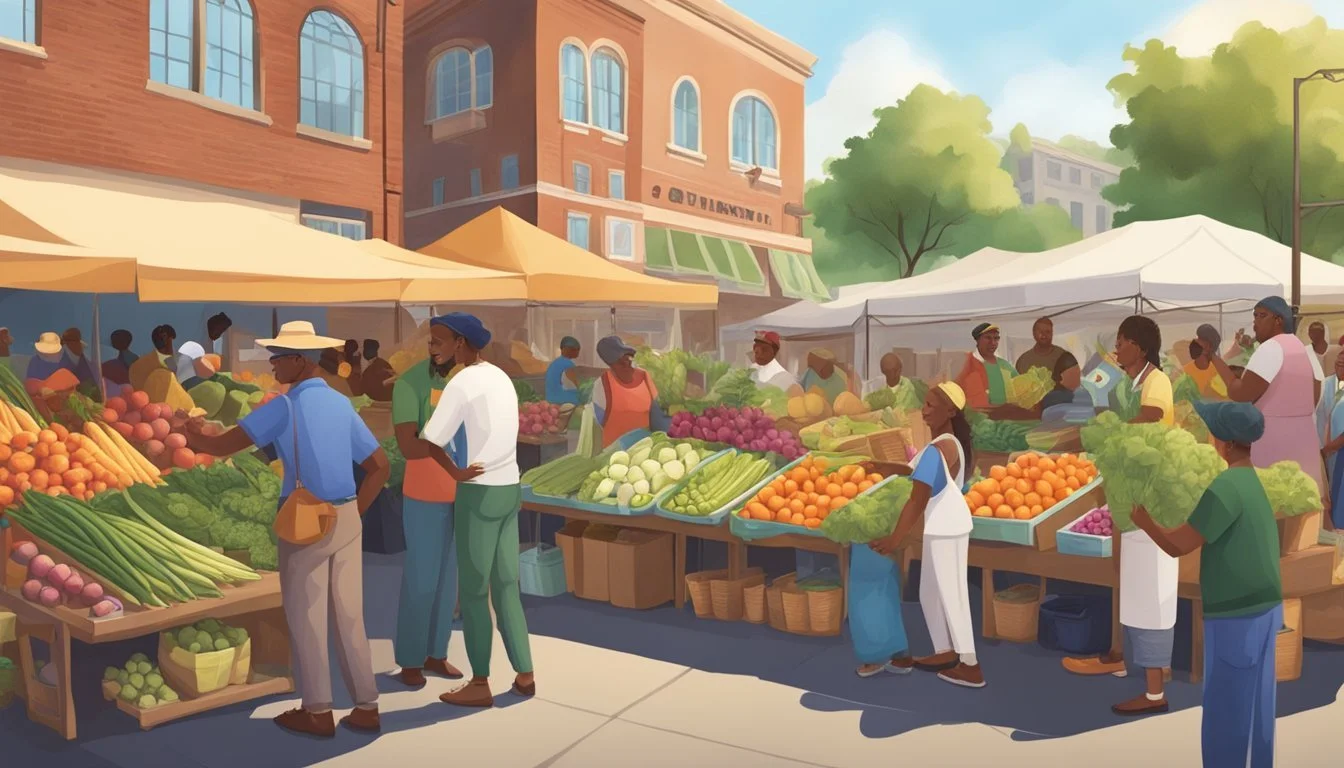Community Supported Agriculture (CSA) in Baton Rouge, LA
A Guide to Local Farm Partnerships
Community Supported Agriculture, commonly known as CSA, has become a vital part of the local food movement in Baton Rouge, Louisiana. Through CSA programs, residents have the opportunity to invest in local farms, ensuring a supply of fresh, seasonal produce while strengthening the bond between farmers and the community. This model not only promotes sustainable agriculture within the region but also allows consumers to become active participants in the growth and consumption of their food.
In Baton Rouge, CSA members subscribe to receive a share of the harvest from local farms such as Luckett Farms and Fullness Farms. These subscriptions offer a reliable source of income for farmers, fostering economic stability and encouraging environmentally friendly farming practices. CSA members benefit by getting a direct connection with the source of their food, receiving weekly or bi-weekly shares of fruits, vegetables, and other farm products.
The variety of CSA options available in Baton Rouge caters to an array of preferences and needs, from options that include only produce to those providing a more diverse selection of farm goods. The rise of CSA programs in the area reflects a growing awareness and appreciation for locally-sourced food, illustrating a commitment to sustainability and community support within the agricultural ecosystem of Louisiana's capital city.
Understanding CSA
Community Supported Agriculture represents a model of food production and distribution that reconnects local farmers with their surrounding community. It's a partnership where residents receive fresh produce directly from area farms, fostering a sustainable food system.
Principles of Community Supported Agriculture
At the core of Community Supported Agriculture (CSA) is the idea of mutual support and shared risk between the farmer and community members. Those who buy into a CSA, typically referred to as members or shareholders, pay in advance for a season's worth of agricultural produce. This upfront investment allows the farmer to plan accordingly for the season, purchase necessary seeds, equipment, and manage operational costs.
Fresh, Local Produce: Shareholders receive a weekly or bi-weekly allocation of fresh goods.
Investment in Local Agriculture: The community's investment offers financial stability for local farms.
Shareholders benefit by getting regular supplies of fresh, locally grown produce, often at a lower cost than what they would pay at a retail store or farmer's market.
History of CSA in Baton Rouge
In Baton Rouge, the CSA model has taken root largely due to the region's rich agricultural heritage and a growing demand for farm-to-table products. Farms like Luckett Farms CSA, located near the East Baton Rouge and East Feliciana Parish line, offer seasonal vegetables to residents of Baton Rouge and its surrounding areas. Such models facilitate direct relationships between Baton Rouge residents and the farmers who nourish their community.
CSA VS Traditional Farming
The CSA model is distinct from traditional farming practices primarily in its community engagement and economic structure.
Feature CSA Traditional Farming Consumer Interaction High, with direct community relationships Variable, often limited to retail or wholesale Economic Model Upfront payment; shared risks and rewards Pay per product; consumer bears less risk Product Distribution Regular shares distributed to members Products sold individually per demand Focus on Local Prioritizes local produce and local consumers Wider geographic distribution
CSAs focus on local farms and produce, incentivizing agricultural and monetary support within the community. The member's investment is not just in the food itself but also in the local farm's continued operation and success. This differs significantly from the more conventional farming approach that often markets produce without such a localized or personal economic model.
How CSA Works
Community Supported Agriculture (CSA) in Baton Rouge, LA, operates on the foundation of memberships where members receive fresh, local produce through a structured subscription model. This system emphasizes seasonal availability and fosters community relationships with local farmers.
The Role of Memberships
Memberships form the core of the CSA model. Community members commit financially to a farm, which in turn provides them with a portion of the harvest throughout the farming season. This upfront investment helps support the farm's operational costs and allows farmers to plan for the season's production with greater certainty.
Shares and Subscription Models
CSA members typically purchase shares or subscriptions before the growing season starts. A share represents a portion of the seasonal vegetables and other produce that a member will receive. These are often detailed in the terms of the CSA subscription, outlining what members can expect in terms of quantity and variety.
Full Share: Ideal for larger households or those with a vegetarian diet.
Half Share: Suitable for smaller households or as a supplementary source of produce.
Members receive their shares through weekly deliveries or at designated distribution points, depending on the specific CSA structure.
Seasonal Availability and Distribution
The CSA model is built around seasonal availability, with members receiving produce that is currently being harvested. This ensures that they get the freshest possible vegetables and fruit while also reducing food miles and supporting sustainable agriculture practices.
Distribution typically happens on a weekly basis, with locations set within Baton Rouge and surrounding areas for members to collect their shares. Farms like Luckett Farms CSA offer a variety of pick-up points across the region for member convenience.
Benefits of Joining a CSA
Community Supported Agriculture (CSA) programs in Baton Rouge offer a plethora of advantages to their members, ranging from the quality of produce to support of local agriculture and sustainable practices.
Access to Fresh and Organic Produce
CSA members enjoy fresh produce that is often organic, meaning it's grown without synthetic pesticides or fertilizers. With produce typically picked within hours of distribution, the freshness translates to better taste and nutritional value. Many Baton Rouge area CSAs, such as Luckett Farms, assure a localharvest that connects residents directly with their food source.
Type of Products available:
Vegetables
Fruits
Herbs
Occasionally, other products like honey or eggs
Supporting Local Farmers and Economy
When you join a CSA, your money goes straight to local farmers, bolstering the local economy and ensuring that family farms like those found in East Baton Rouge and East Feliciana Parish can thrive. Local farms gain the financial security of upfront payments which help them plan and manage their farming operations more effectively.
Economic Impacts:
Direct financial support to farmers
Money stays within the local community
Environmental and Health Advantages
CSAs advocate for sustainable agriculture by minimizing the distance food travels, thus reducing carbon emissions. This local approach enhances community health by providing nutrient-rich options and fostering a relationship with food that is eco-conscious. CSA members often experience a broader variety of produce, which encourages a diverse and healthy diet.
Sustainable Practices:
Crop rotation
Reduced food miles
Less packaging waste
Health Benefits:
Exposure to a variety of nutrients
Minimal processing
Lowered exposure to preservatives
Challenges and Considerations
Participating in a Community Supported Agriculture (CSA) program in Baton Rouge, LA comes with inherent challenges and considerations that both farmers and members must acknowledge. These revolve around fluctuating weather patterns, the commitment required from members, and the financial and quantity aspects of share sizes.
Weather Dependent Risks
Weather plays a pivotal role in agricultural yields. CSA farms in Baton Rouge may face unpredictable weather events such as heavy rains or droughts, impacting the quantity and quality of harvests. Members share in the risk of farming, meaning that poor weather can result in smaller or less varied shares.
Commitment Expectations
Members typically make an advance commitment to a farm, which could last an entire growing season. This commitment binds members to the CSA, requiring them to adapt their consumption to the seasonal ebb and flow of available produce. It's crucial for members to understand that their involvement is a pact supporting both the highs and lows of agricultural production.
Understanding Share Sizes and Costs
The cost of a CSA share is often paid upfront and can vary based on size and season length. Shareholders should be informed about what to expect:
Small Share: Best for individuals or small households.
Large Share: Suitable for families or those with a high consumption of fresh produce.
Pricing is typically reflective of the share size, and while upfront costs may seem high, they cover the duration of the farm's growing season. Members must gauge the share they can reasonably consume to ensure they are getting the full value of their investment.
Local CSAs in Baton Rouge
Baton Rouge, Louisiana, is home to a vibrant community of Community Supported Agriculture (CSA) programs that provide residents with fresh, locally-sourced produce. From the heart of the city to the rural outskirts, these CSAs connect consumers directly with the efforts of local farmers.
Luckett Farms at Central
Luckett Farms operates within the Greater Baton Rouge Area, notably in Central and Pride, offering a CSA Membership that spans a range of communities including Baker, Denham Springs, Greenwell Springs, Prairieville, Slaughter, and Zachary. This local family farm works tirelessly seven days a week to ensure that members receive high-quality, homegrown produce at affordable prices. Members of the CSA can enjoy seasonal selections direct from the farm—a testament to the farm's commitment to sustainability and community enrichment.
Port Hudson Organics
Port Hudson Organics, nestled near the historic area of Port Hudson, focuses on providing organic produce to the Baton Rouge region. This CSA is known for its adherence to organic farming practices, ensuring that its subscribers receive pesticide-free and non-GMO fruits and vegetables. The farm serves as a bridge between Baton Rouge residents and the organic bounty of Louisiana's fertile lands.
Fullness Organic Farm in Pride
Located in Pride, Fullness Organic Farm takes pride in offering a CSA program that adheres to strict organic standards. The farm uses no synthetic fertilizers or pesticides, providing Baton Rouge with pure, nutrient-dense produce. With an emphasis on ecological farming practices, Fullness Organic Farm supports the health of both its customers and the environment.
How to Choose the Right CSA
Choosing the right Community Supported Agriculture (CSA) program in Baton Rouge, LA, hinges on understanding your personal food preferences, the agricultural practices of the farm, and the range of products offered.
Identifying Your Produce Preferences
Customers should clearly define their expectations for produce such as vegetables and fruit to align with their dietary preferences and cooking habits. Those with a preference for organic options should look for CSAs that prioritize organic farming practices, ensuring their food is free from harmful chemicals and GMOs.
Investigating Farming Practices
It is crucial to research the farming practices of CSAs to ensure quality and sustainability. Prospective members may inquire about the use of chemicals in growing produce or the adoption of practices that promote horticultural health and the farm's ecological balance.
Evaluating Additional Offerings
Some CSAs go beyond traditional farm products, offering items like eggs, flowers, or specialty goods. This value-added proposition can be attractive for those looking to expand their support of local agriculture and enjoy a broader range of seasonal offerings.
Member Experiences and Community Impact
In Baton Rouge, Louisiana, the implementation of CSA programs has catalyzed a noteworthy shift in member satisfaction, community engagement, and educational outreach. These subsections reflect the multifaceted benefits members and the community at large receive from such initiatives, showcasing real experiences and opportunities for involvement.
Testimonials and Satisfaction Surveys
Community members who participate in CSA programs often report high levels of satisfaction. Through satisfaction surveys conducted by various CSA farms, feedback has shown that members appreciate the fresh, locally grown produce and feel they are contributing positively to their local economy. The surveys serve as tools for farms to continuously improve and tailor their offerings. For instance, Luckett Farms CSA might utilize member feedback to refine their crop selection or distribution methods to enhance the overall member experience.
Community Engagement through Volunteering
CSA farms in Baton Rouge actively encourage community engagement through volunteering. This not only helps the farms with crucial agricultural tasks but also forges a deeper connection between members and the farmers. For example, Fullness Farms provides opportunities for CSA members and non-members alike to volunteer, thereby fostering community support and allowing participants to gain firsthand knowledge of sustainable farming practices.
Education and Outreach
Educational outreach is an integral component of the CSA model. CSA programs often collaborate with entities like the LSU AgCenter to deliver webinars and educational programs that inform the Baton Rouge community about the significance of sustainable agriculture. They aim to bridge the gap between consumers and food production, by improving members’ understanding of where their food comes from and the work that goes into growing it. UIBarButtonItem
Through these multifaceted community engagements, Baton Rouge CSA programs strive to enhance both their members' experience and their community's wellbeing through structured education, volunteer opportunities, and consistent feedback mechanisms.
Future of CSA in Baton Rouge
The landscape of Community-Supported Agriculture (CSA) in Baton Rouge is poised for significant progression, focusing on sustainability, technological innovation, and strengthening regional food security. These developments will not only support local farmers but also cater to an increasing consumer demand for fresh, locally grown produce.
Potential for Growth and Expansion
The CSA model in Baton Rouge has a strong foundation, with multiple farms like Luckett Farms and initiatives such as the Port Hudson Organics indicating the region's responsiveness to CSA programs. The potential for growth and expansion is high, driven by local demand and support. The expansion is evident through different channels like farmers markets, where consumers are directly interacting with producers. With continuous support from entities such as the USDA, the city's CSA programs could broaden their reach, ultimately supporting more local farmers and consumers.
Innovation in Community Agriculture
Innovation in community agriculture through CSA is an emerging trend in Baton Rouge. Farms could leverage technology for more efficient production and distribution. These advancements may manifest as online subscription services, mobile apps for customer engagement, and data analytics to optimize crop yields and farming practices. This integration of technology will not only enhance the CSA experience but also contribute to sustainability efforts by reducing waste and improving resource management.
Championing Regional Food Security
Baton Rouge's CSA programs are key players in championing regional food security. By increasing the availability of nutritious, affordable produce, CSAs like Fullness Farms work towards the larger goal of ensuring that all residents have access to healthy food. A strong emphasis on CSA supports the development of local agriculture and can provide stability in food supply—a crucial aspect during unforeseen circumstances such as extreme weather events or supply chain disruptions. With CSAs at the forefront, Baton Rouge can build a resilient food system that supports both the community and its farmers.

